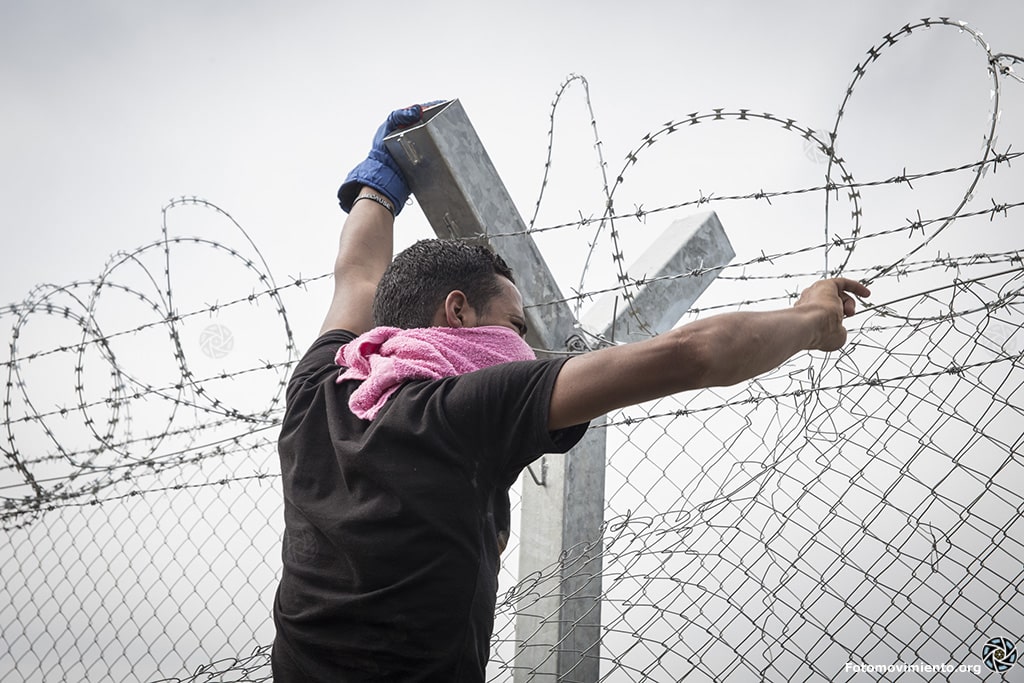We met in the mud of Idomeni in March 2016. He was skinny and had a light beard. He spoke modified Moroccan Arabic, skipping the Amazigh, French and Spanish words and replacing them with standard Arabic ones so that we from the Peninsula would understand him. He spoke quickly as if someone was after him. He took deep puffs from his cigarettes like each one of them would be his last. He had lived chasing an uncertain destination for two years, travelling through closed borders full of landmines.
He was one of the three thousand migrants who had recently crossed the border into Northern Macedonia on foot and were pushed back by the army, robbed, beaten and then thrown a whole day’s worth of walking from the Idomeni border camp on the Greek side of the border. They collectively challenged the barriers that EU states had put in their way and were collectively humiliated and robbed of their freedom of movement.
The second place where I met him was in Micro Dassos, a small village close to Idomeni. He was living in a house rented by a loosely organized group of anarchists and other solidarity people who cooked thousands of meals for migrants in huge pots every day.
He was almost always speaking. The only time he was quiet was in the morning, just after he woke up. He sat on the doorstep with a big cup of coffee beside him, holding a cigarette between two fingers of his right hand. He dragged on it as if the bricks of his soul were vanishing every second, and the cigarette smoke was holding the walls of his soul together, replacing the vanishing pieces. He would not respond to your ‘good morning,’ he would not return your smile, he would not answer your ‘how did you sleep?’ It was his grounding moment, when the phoenix of his soul was getting reborn from the ash of the dreams and shaking the dust from his wings.
Then he stood up, refilled his coffee from the thermos in the middle of the courtyard, put some peanut butter on two slices of bread and then joined the table with the rest of us. Then he started speaking. He would acknowledge everyone around the table and share some laughter with the group around him. I still do not know which place in Morocco he came from or what kind of life he had before starting his journey. Somehow he never gave any space for questions. Sometimes digging for answers is to put your dagger in someone’s living skin. Sometimes asking a question is lighting a fire on the fuse, which will explode the equilibrium of one’s soul.
We had beers and cigarettes in the evening and visited police stations where the authorities had put teenagers in so-called” protection custody”. We provided independent information about what was next in a time when Europe’s external and internal borders were being closed ever more tightly to prevent the freedom of movement of migrants. He stirred the food pots the whole day. He interpreted for the prison group when my Arabic was not enough, and we had to call him and disrupt him from whatever he was doing. He would distribute food to migrants who were in the forests around Idomeni, hiding from the police. Meanwhile, he tried to get away from the hell of captivity along with 12,000 migrants who were in the Idomeni camp.
The third place where I met him was in Leipzig in September 2017. After the Greek government evicted Idomeni in May 2016 and the authorities forcibly moved people to different camps throughout Greece, he got on a bike, put panniers on it, camouflaged himself with proper cyclist clothes and a helmet, and started biking towards Germany. People in solidarity hosted him along the way, and he had to cycle up many mountain roads to avoid border police. He then went straight to the German authorities on his own terms to apply for asylum, after crossing the border and having a beer and a cigarette.
Not much had changed in him when I met him in Leipzig. The people around him were the same people who were around him in Idomeni. He was proud of defeating all those militarized borders in his personal war for his freedom of movement riding on a bicycle, pretending to be a long tour cyclist. Reaching the “destination” had not made him less talkative. Instead of a doorstep, he would sit in the garden of the squatted house where he lived, smoke his cigarette and drink his coffee in silence. Our friends told me that he had asthma and some other illnesses and that the doctor has forbidden him from smoking and drinking. I did get worried.
But I never told him about my worries because I knew he would ride up that mountain as well, on his own terms and in his own time. The phoenix needs to take his time to shake ash from his wings.




